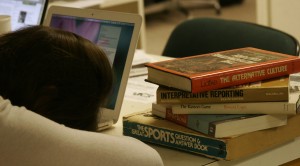
Drue Sokol, Photo Editor
I am an English major. I can and do proudly proclaim this while knowingly attending a research oriented, heavily science-based university. I also proclaim this despite the many articles and studies that deem my major “useless,” much like Newsweek did in April when they named English (along with anthropology, music and history) subjects among the “13 Most Useless Majors.”
Newsweek is not the only offender when it comes to nonchalantly dismissing a majority of the humanities majors. From friends to parents to strangers, we in the humanities are constantly undermined throughout our careers. Friends often say to me, “Oh, you’re an English major. You don’t have any work to do!” I’m not sure where they think I go to school, but I’m pretty certain that I go to UR.
I’m not studying to be a chemical engineer nor am I studying to become a brain surgeon. I’ll admit that my “Better CDCS” schedule does look rather sparse compared to most science majors, who have all of those labs and workshops to attend.
Yet the empty space is an illusion. The time I spend in class doesn’t correlate to how much work I do. I still spend nights in Rush Rhees until closing time at 3 a.m. studying and still find myself bewildered at how much work I have to do as I make camp in Gleason for the night.
Let me make myself clear. I haven’t made claims to a bigger work load than those involved in the sciences. Our time is just devoted differently. I may have a week to work on a paper while those in organic chemistry have a few days to finish a lab.
But ask a neuroscience major to transcribe William Caxton’s prologue to his translation of Eneydos; or ask an optics major to write a 15-page paper on the rhetorical strategies that Franklin D. Roosevelt utilized during his presidency in order to help the United States endure the Great Depression and win World War II. They can do it, sure. But only after a certain amount of effort — the same amount of effort it would take for me to write up a lab report or study for a genetics exam — would it be achieved.
It’s a matter of perspective. The work I do is not desired by others. The work others do is not what I desire. I chose to pursue what I am passionate about; it just so happens that those pursuits fall under a mostly overlooked and undermined field of study. Why lessen the value of my interests because I seem to have less work?
We in the humanities love what we study. I mean, we really love it. We have to. In order to pursue a major in humanities, I have to accept that I probably won’t get a job out of college or that I will not be vied for by anyone, really, without a master’s degree or a Ph. D. I will also probably never get paid as substantially as a biomedical engineer would unless I somehow become a renowned author or artist. And that’s OK with me.
So keep on you history buffs, you prolific poets, you aspiring musicians and artists. The world needs you just as much as it needs engineers, doctors and accountants. Movies and television shows would be undirected without us to direct them. Novels and magazines would be unpublished without us to publish them. Historical mysteries and paradoxes would remain unchallenged without us to challenge them.
John Keating, an English teacher portrayed by Robin Williams in the movie “Dead Poets Society,” professed what many of us invested in humanities would acknowledge as true: “Medicine, law, business, engineering: These are all noble pursuits and necessary to sustain life. But poetry, beauty, romance, love … these are what we stay alive for.”
Mariner is a member of the class of 2015.
